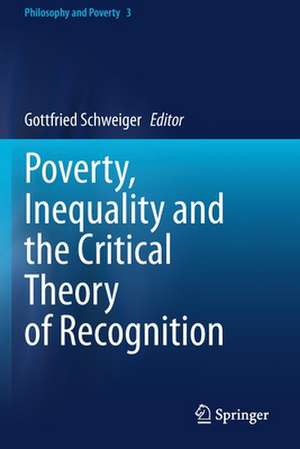Poverty, Inequality and the Critical Theory of Recognition: Philosophy and Poverty, cartea 3
Editat de Gottfried Schweigeren Limba Engleză Paperback – 22 iul 2021
“If one believed that the theme of “recognition” had been theoretically exhausted over the last couple of years, this book sets the record straight. The central point of all the studies collected here is that poverty is best understood in its socialcauses, psychic consequences and moral injustice when studied within the framework of recognition theory. Regardless of how recognition is defined in detail, poverty is best captured as the absence of all material and cultural conditions for being recognized as a human being. Whoever is interested in the many facets of poverty is well advised to consult this path-breaking book.” Axel Honneth, Columbia University.
| Toate formatele și edițiile | Preț | Express |
|---|---|---|
| Paperback (1) | 642.18 lei 6-8 săpt. | |
| Springer International Publishing – 22 iul 2021 | 642.18 lei 6-8 săpt. | |
| Hardback (1) | 648.42 lei 6-8 săpt. | |
| Springer International Publishing – 21 iul 2020 | 648.42 lei 6-8 săpt. |
Preț: 642.18 lei
Preț vechi: 755.51 lei
-15% Nou
Puncte Express: 963
Preț estimativ în valută:
122.92€ • 133.56$ • 103.32£
122.92€ • 133.56$ • 103.32£
Carte tipărită la comandă
Livrare economică 22 aprilie-06 mai
Preluare comenzi: 021 569.72.76
Specificații
ISBN-13: 9783030457976
ISBN-10: 3030457974
Ilustrații: IX, 321 p. 1 illus.
Dimensiuni: 155 x 235 mm
Greutate: 0.47 kg
Ediția:1st ed. 2020
Editura: Springer International Publishing
Colecția Springer
Seria Philosophy and Poverty
Locul publicării:Cham, Switzerland
ISBN-10: 3030457974
Ilustrații: IX, 321 p. 1 illus.
Dimensiuni: 155 x 235 mm
Greutate: 0.47 kg
Ediția:1st ed. 2020
Editura: Springer International Publishing
Colecția Springer
Seria Philosophy and Poverty
Locul publicării:Cham, Switzerland
Cuprins
Chapter 1. Recognition and Poverty: An Introduction (Gottfried Schweiger).- Part I: Recognition and Poverty in Fichte and Hegel.- Chapter 2. Fichte’s Concept of Recognition and Poverty as Material Deprivation (Esther Neuhann).- Chapter 3. Poverty and Recognition in Hegel’s Philosophy of Right (Bernardo Ferro).- Part II: Recognition and the Injustice of (Global) Poverty.- Chapter 4. Civic Poverty and Recognition (Gustavo Pereira).- Chapter 5. Misrecognition of the Rural White Working Class (Dylan Rohr).- Chapter 6. Recognition, Poverty and Self-Respect (Jonathan Seglow).- Chapter 7. Disappointed Expectations: On Misrecognition and Poverty (Gottfried Schweiger).- Chapter 8. Suffering Poverty: Towards a Global Recognitive Justice (Renante Pilapil).- Chapter 9. Recognition of the Poor on the International and Global Levels: On Dilemmas of Axel Honneth’s Theory (Marek Hrubec).- Chapter 10. The Harms of Global Poverty as Misrecognition: Social Suffering, Invisibility, Alienation (Monica Mookherjee).- Part III: Recognition and Poverty Alleviation Politics.- Chapter 11. When Microcredit Doesn’t Empower Poor Women: Recognition Theory’s Contribution to the Debate over Adaptive Preferences (David Ingram).- Chapter 12. Relational Poverty, Domination and Social Esteem: Recognizing the Poor’s Agency via a Deliberative Approach to Anti-Poverty Policies (Pedro Lippmann and Katarina Fargosa).- Chapter 13. Universal Basic Income as a Recognition-Based Policy against Poverty (Gustavo Cunha).- Chapter 14. Crime and Punishment of the Poor from Recognition Theory Perspective (Javier Cigüela Sola).
Notă biografică
Gottfried Schweiger is a Senior Scientist at the Centre for Ethics and Poverty Research, University of Salzburg. He works in social and political philosophy. Previous publications include (co-authored with Gunter Graf) “A Philosophical Examination of Social Justice and Child Poverty” (Palgrave Macmillan 2015) and (co-edited with Johannes Drerup, Gunter Graf and Christoph Schickhardt) “Justice, Education and the Politics of Childhood” (Springer 2016).
Textul de pe ultima copertă
This book brings together philosophical approaches to explore the relation of recognition and poverty. This volume examines how critical theories of recognition can be utilized to enhance our understanding, evaluation and critique of poverty and social inequalities. Furthermore, chapters in this book explore anti-poverty policies, development aid and duties towards the (global) poor. This book includes critical examinations of reflections on poverty and related issues in the work of past and present philosophers of recognition. This book hopes to contribute to the ongoing and expanding debate on recognition in ethics, political and social philosophy by focusing on poverty, which is one highly important social and global challenge.
“If one believed that the theme of “recognition” had been theoretically exhausted over the last couple of years, this book sets the record straight. The central point of all the studies collected here is that poverty is best understood in its social causes,psychic consequences and moral injustice when studied within the framework of recognition theory. Regardless of how recognition is defined in detail, poverty is best captured as the absence of all material and cultural conditions for being recognized as a human being. Whoever is interested in the many facets of poverty is well advised to consult this path-breaking book.” Axel Honneth, Columbia University.
Caracteristici
First Book on Recognition and Poverty Brings Together a Leading International Scholars on the much Debated Issue of Recognition as a Key Concept in Critical Theory Provides Philosophical Insights into the Injustice of Poverty Shows how Recognition Theory can be a Valuable Tool to Analyze and Criticize Poverty in Both the Developing and the Developed Worlds Examines the Link Between Recognition, Poverty and Criminal Responsibility and How the Criminalization of Certain Practices Affects the Poor


